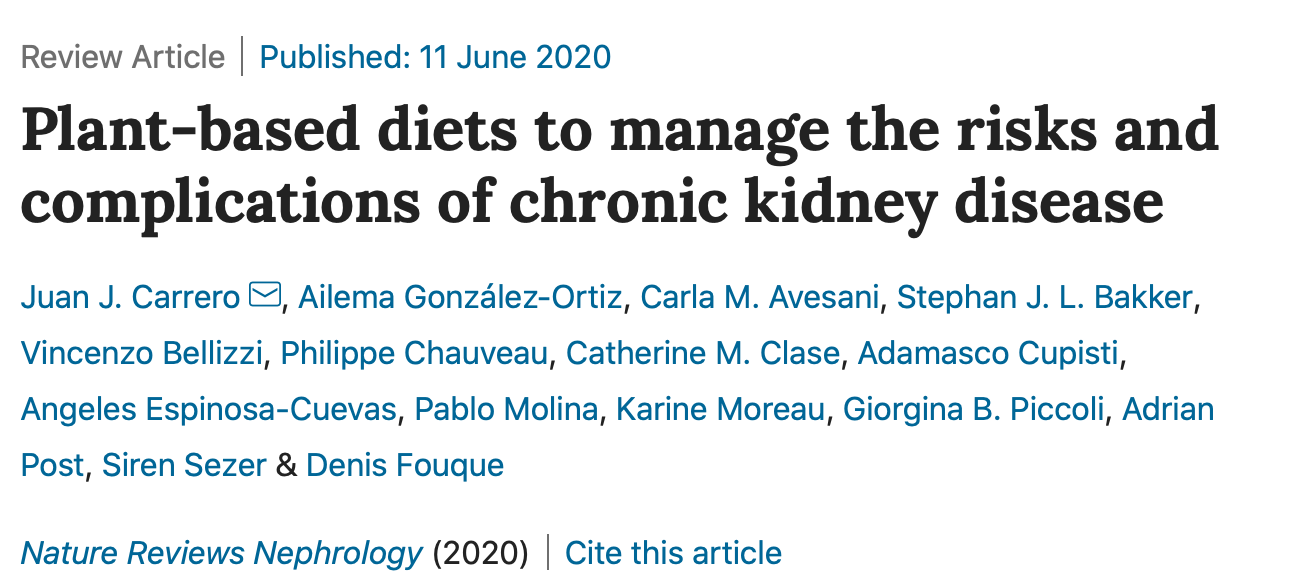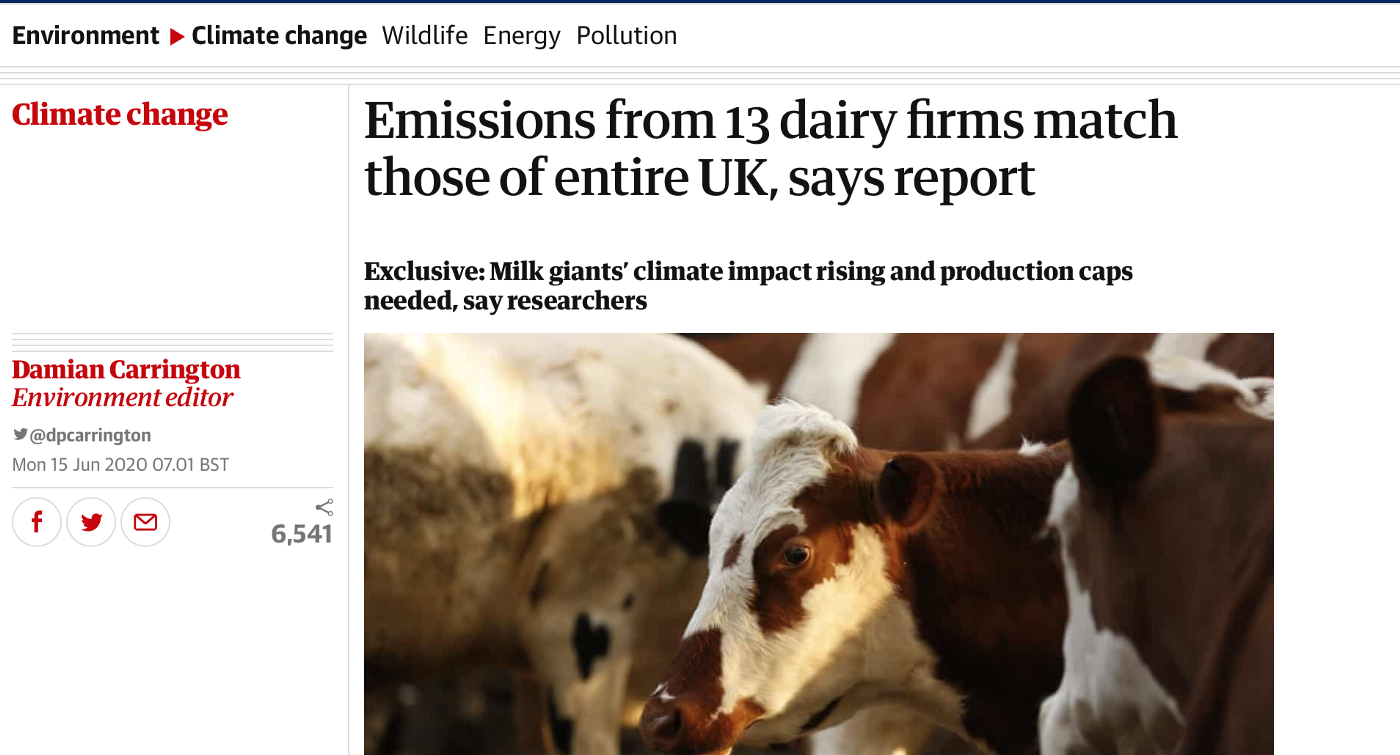A review of the week’s plant-based nutrition news 21st June 2020
This week I am exciting to share progress in the science supporting plant-based diets for kidney disease and for healthy aging.
PLANT-BASED DIETS FOR KIDNEY DISEASE: For so long the medical profession has accepted the narrative that plant-based diets are not suitable for people with kidney failure. Finally, review papers and clinical studies are demonstrating this not to be true and actually appropriately planned plant-based diets may be more beneficially than meat-based diets (no surprise I am sure to my regular readers!). This review paper is well worth reading as it will bring you up to date on the evidence supporting plant-based diets for prevention and treatment of kidney failure.
The benefits of plant-based diets for kidney health include;
- Choosing plant protein over animal protein is associated with a lower risk of developing kidney failure and can slow the progression of established kidney failure. Plant proteins reduce the workload of the kidneys due to the lower generation of urea and nitrogenous waste products.
- Fibre in plant foods improves the health of the gut microbiome, it reduces insulin resistance, reduced the absorption of potassium and improves the blood lipid profile. These functions are all beneficial to kidney health.
- Plant-based fats are associated with a lower risk of cardiovascular disease
- Dietary acid load is lower when eating plant foods thus improving metabolic acidosis. Animal protein is high in acid-forming substances such as in sulphur-containing amino acids (methionine and cysteine) and therefore provides a high dietary acid load, which increases the risk of renal failure. A plant-based diet reduces dietary acid load since fruits and vegetables are more alkaline.
- Although phosphate is abundant in plant foods, its absorption is less than from animals foods thus improving bone health in kidney failure.
- Despite the worry about high potassium levels in plant foods, clinically this appears to be less of a problem. Studies have not shown an adverse effect on blood potassium levels in patients with renal failure who are consuming a predominately plant-based diet. The reason is thought to be due to the alkalinising effects of plant-based diets. In addition, potassium from plants may promote more intracellular distribution and faecal excretion of potassium, the latter being related to the high fibre content of plant foods.
- Low sodium content of plant-based diets helps manage blood pressure.
- TMAO generated from choline and carnitine present in eggs and meat, has been implicated in causing renal damage and we know that blood TMAO levels are much lower in those who consume a plant-based diet.
- The higher intake of micronutrients from plant-foods can reduce inflammation, oxidative stress, and endothelial dysfunction thus reducing the risk of renal failure.

If you are going to do any one thing to improve kidney health then it seems that removing red and processed meat might be a very good move. This recent study from Iran followed 4881 participants with an average age of 40 years without kidney disease at baseline. After only a median follow up of 3 years, the incidence of chronic kidney disease was 12.6% with the results demonstrating that total red meat intake increased the risk by 71% and processed meat consumption by 99%, comparing participants with the highest and lowest consumption. In substitution analysis, just substituting 1 serving of total red meat and processed meat with 1 serving of low-fat dairy, nuts, whole grains, and legumes was associated with a lower risk of kidney disease (17%, 16%, 21% and 19% lower, respectively). Replacing processed meat in the diet had an even greater effect. The authors suggest that the reduction in risk of kidney failure with greater intake of plant-based foods is likely to be due to the beneficial effects on cardiometabolic risk factors, blood pressure, insulin resistance, oxidative stress, inflammation, endothelial function and the lower dietary acid load.
NOTE OF CAUTION: If you already have kidney disease, then any change in your diet should be done in conjunction with the support of a renal dietitian.
PLANT PROTEIN FOR HEALTHY AGING: It is generally accepted that elders or those over the age of 65 years may need to eat more protein to prevent age-related muscle loss and general frailty. This is debated, but the European clinical guidelines for geriatrics recommends a protein intake of at least1g protein per kg body weight per day and 1–1.2g per day is thought to be good to aim for. This higher intake of protein has usually been assumed best obtained from meat. This concept is now changing given the enormous benefits to health for adults <65 years of obtaining protein predominantly from plant sources.
The study highlighted reports data from the MEDIS and ATTICA cross-sectional population studies from Greece and included 3349 Greek women and men over 50 years old. Diet data was correlated with the Successful Aging Index (SAI), which has been found to be associated with the ageing process. The index encompasses health-related social, lifestyle and clinical factors, including education, financial status, physical activity, BMI, depression, participation in social activities with friends and family, number of yearly excursions, total number of clinical CVD risk factors (i.e., history of hypertension, diabetes, hypercholesterolaemia and obesity) and level of adherence to the Mediterranean diet.
The results showed that the consumption of a diet high in plant sources of protein was associated with more favourable successful ageing in adults aged>50 years old. No association was seen between animal-based protein and successful aging.
The study concludes ‘Based on the findings of the present work, the consumption of a plant-based protein-rich diet seems to be a beneficial nutritional choice that should be promoted and encouraged to older people.’
A previous paper from the same study cohort reported benefits of whole grain consumption for supporting healthy aging as assessed by the SAI.
This study adds to a growing body of evidence that I have previously highlighted demonstrating the benefits of swapping out animal protein for plant protein. A study of older adults in Spain can be found here and data on older Women in the Nurses’ Health Study can be found here.
DIET AND PROGRESSION OF PARKINSONIAN SIGNS IN OLDER ADULTS: Signs of Parkinson’s disease (PD) are common in older adults even without a diagnosis of PD. This may be as common as 1 in 2 adults by the age of 85 years and is associated with increased risk of disability, adverse health outcomes and mortality. Healthy diet patterns, including Mediterranean-DASH Intervention for Neurodegenerative Disease (MIND) and Mediterranean diets, are associated with reduced risk of parkinsonism and disability. This study included 682 participants without a clinical diagnosis of PD from the Rush Memory and Aging Project (longitudinal cohort study) assessed annually over an average of 5.7 years. The aim of the study was to examine the association of antioxidant intake with progression of signs of Parkinson’s. Food frequency questionaires were used to specifically analyse the intake of carotenoids, vitamin E and vitamin C. The average age of the participants was 80.3 years at the time of the first dietary assessment and 93% were white. The results showed that dietary intakes of antioxidant nutrients including carotenoids, vitamin E and vitamin C were associated with slower progression of parkinsonian signs. The proposed mechanism for this finding is likely to be the anti-oxidant and anti-inflammatory effects of these nutrients given that oxidative stress and inflammation are two main mechanisms for neurodegenerative disorders in older adults.
It’s best to get your anti-oxidants from food, with little evidence to support the use of supplements. This is easily achievable on a varied plant-based diet.
Vitamin C: Broccoli, Brussels sprouts, cantaloupe, cauliflower, grapefruit, leafy greens (turnip, mustard, beet, collards), honeydew, kale, kiwi, lemon, orange, papaya, snow peas, strawberries, sweet potato, tomatoes, and bell peppers (all colors)
Vitamin E: Almonds, avocado, Swiss chard, leafy greens (beet, mustard, turnip), peanuts, red peppers, spinach (boiled), and sunflower seeds
Carotenoids including beta-carotene and lycopene: Apricots, asparagus, beets, broccoli, cantaloupe, carrots, bell peppers, kale, mangos, turnip and collard greens, oranges, peaches, pink grapefruit, pumpkin, winter squash, spinach, sweet potato, tangerines, tomatoes, and watermelon
Selenium: Brazil nuts, barley, brown rice
Zinc: Sesame seeds, pumpkin seeds, chickpeas, lentils, cashews
Phenolic compounds: Quercetin (apples, onions), catechins (tea, cocoa, berries), resveratrol (grapes, peanuts, berries), coumaric acid (spices, berries), anthocyanins (blueberries, strawberries)
DIET AND CARDIOVASCULAR DISEASE (CVD): I can’t give enough importance to diet and CVD. It still remains the top cause of death globally, yet diet and lifestyle could prevent more the 80% of CVD cases. So no apologies for highlighting again the impact of a healthy diet pattern. This study reports data from 74,930 women enrolled in the Nurses’ Health Study, 90,864 women in the Nurses’ Health Study II, and 43,339 men in the Health Professionals Follow-Up Study. It examines the association between adherence to 4 healthy eating scores — Healthy Eating Index-2015 (HEI-2015); Alternate Mediterranean Diet Score (AMED); Healthful Plant-Based Diet Index (HPDI); and Alternate Healthy Eating Index (AHEI) — and the risk of CVD. During a follow-up period of 32 years, the results showed that high adherence to all 4 healthy diet scores was associated with a 14–21% lower risk of CVD when compared to those least adherence to the healthy diets examined.
The overall conclusions suggest that a range of healthy diets can benefit cardiovascular health ranging from completely plant-based to mostly plant-based. All of these healthy diet scores have in common an emphasis on whole plant foods, dietary fat predominately from plant sources and low or no consumption of red/processed meat, processed foods, trans fats and sugar-sweetened beverages. So there may not have to be one size fits all as long as you are eating predominately fruits, vegetables, whole grains, legumes, nuts and seeds.

ENVIRONMENTAL IMPACT OF DIET CHOICES: The health of humans will not be a concern if we do not preserve the health of the planet, because without a healthy planet there will be no people left. In a report this week from the Institute for Agriculture and Trade Policy, aptly names ‘Milking the Planet’ we learn that ‘Thirteen of the world’s largest dairy corporations combined to emit more greenhouse gases (GHGs) in 2017 than major polluters BHP, the Australia-based mining, oil and gas giant or ConocoPhillips, the United States-based oil company. Unlike growing public scrutiny on fossil fuel companies, little public pressure exists to hold global meat and dairy corporations accountable for their emissions, even as scientific evidence mounts that our food system is responsible for up to 37% of all global emissions’. Despite knowledge of its harm to the environment, the dairy industry continues to expand and their emissions have continued to rise in the 2 years since the last report. 90% of these emissions are generated from the animals themselves. These companies have no intention of taking corrective action and therefore we need a global effort to end this destructive and unnecessary industry.
The medical community is finally accepting that dairy consumption is not necessary for good health in humans, although the message seems slow to filter through to all health practitioners. It now comes down to personal choice as to whether you continue to consumes dairy or not.
Here is a great article debunking all the myths propagated by those who want to find excuses to continue eating meat.
If you have found this article useful, please follow my organisation ‘plant-based health professionals UK’ on Instagram @plantbasedhealthprofessionals and facebook. You can support our work by joining as a member or making a donation via the website.





